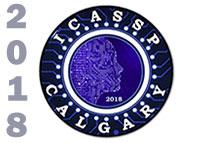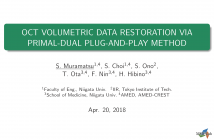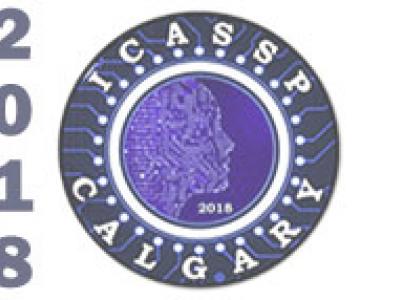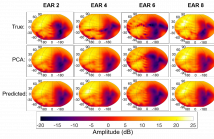
ICASSP is the world’s largest and most comprehensive technical conference focused on signal processing and its applications. The 2019 conference will feature world-class presentations by internationally renowned speakers, cutting-edge session topics and provide a fantastic opportunity to network with like-minded professionals from around the world. Visit website.

- Read more about OCT VOLUMETRIC DATA RESTORATION VIA PRIMAL-DUAL PLUG-AND-PLAY METHOD
- Log in to post comments
This work proposes a volumetric data restoration method, especially for data acquired through an optical coherence tomography (OCT) device. OCT is a technique for acquiring a tomographic image of a specimen object in a few $\mu$m scale by using a near infrared laser. The authors have been trying dynamic observation of epithelium in cochlear of the inner ear. Currently, there is a problem to remove the influence of the measurement process as well as noise due to image sensor sensitivity.
- Categories:
 147 Views
147 Views
Henze-Penrose divergence is a non-parametric divergence measure that can be used to estimate a bound on the Bayes error in a binary classification problem. In this paper, we show that a cross- match statistic based on optimal weighted matching can be used to directly estimate Henze-Penrose divergence. Unlike an earlier approach based on the Friedman-Rafsky minimal spanning tree statistic, the proposed method is dimension-independent. The new approach is evaluated using simulation and applied to real datasets to obtain Bayes error estimates.
icassp2018.pdf
- Categories:
 16 Views
16 Views
- Read more about BSS EVAL OR PEASS? PREDICTING THE PERCEPTION OF SINGING-VOICE SEPARATION
- Log in to post comments
There is some uncertainty as to whether objective metrics for predicting the perceived quality of audio source separation are sufficiently accurate. This issue was investigated by employing a revised experimental methodology to collect subjective ratings of sound quality and interference of singing-voice recordings that have been extracted from musical mixtures using state-of-the-art audio source separation. A correlation analysis between the experimental data and the measures of two objective evaluation toolkits, BSS Eval and PEASS, was performed to assess their performance.
- Categories:
 13 Views
13 Views
- Read more about Language and Noise Transfer in Speech Enhancement Generative Adversarial Network
- Log in to post comments
- Categories:
 10 Views
10 Views
- Read more about Matching Pursuit Based Convolutional Sparse Coding
- Log in to post comments
Sparse coding techniques for image processing traditionally rely on processing small overlapping patches separately followed by averaging. This has the disadvantage that the reconstructed image no longer obeys the sparsity prior used in the processing. For this purpose convolutional sparse coding has been introduced, where a shift-invariant dictionary is used and the sparsity of the recovered image is maintained. Most such strategies target the $\ell_0$ ``norm'' of the whole image, which may create an imbalanced sparsity across various regions in the image.
- Categories:
 58 Views
58 Views
- Read more about A sparse coding framework for gaze prediction in egocentric video
- Log in to post comments
- Categories:
 14 Views
14 Views
- Read more about Spatial audio feature discovery with convolutional neural networks
- Log in to post comments
The advent of mixed reality consumer products brings about a pressing need to develop and improve spatial sound rendering techniques for a broad user base. Despite a large body of prior work, the precise nature and importance of various sound localization cues and how they should be personalized for an individual user to improve localization performance is still an open research problem. Here we propose training a convolutional neural network (CNN) to classify the elevation angle of spatially rendered sounds and employing Layerwise Relevance Propagation (LRP) on the trained CNN model.
- Categories:
 39 Views
39 Views
- Read more about Soft-Target Training with Ambiguous Emotional Utterances for DNN-based Speech Emotion Classification
- Log in to post comments
- Categories:
 59 Views
59 Views
- Read more about SEQUENTIAL MAXIMUM MARGIN CLASSIFIERS FOR PARTIALLY LABELED DATA
- Log in to post comments
poster.pdf
- Categories:
 8 Views
8 Views
- Read more about Considerations regarding individualization of head-related transfer functions
- Log in to post comments
This paper provides some considerations regarding using individualized head-related transfer functions for rendering binaural spatial audio over headphones. It briefly considers the degree of benefit that individualization may provide. It then examines the degree of variation existing within the ear morphology across listeners within the Sydney-York Morphological and Recording of Ears (SYMARE) database using kernel principal component analysis and the large deformation diffeomorphic metric mapping framework.
- Categories:
 34 Views
34 Views